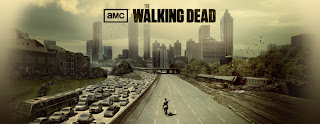*WALKING DEAD SEASON ONE AND TWO SPOILERS*
1) Will someone please supervise Carl?
It seems like every episode features at least on person asking, "where's Carl?" Lori already isn't exactly a shining beacon of good parenting, but how hard could it possibly be to keep one eye on your son during the zombie apocalypse? And where is Rick? I get that Rick has to leave camp at least three times an episode, but maybe he could sit down with his son and explain to him that there are undead monsters trying to kill everyone and that a child has a slightly worse chance of surviving away from camp than his police officer father. Next season, maybe one of Carl's parents will do us all a favor and place some adult supervision over their young son. Or at least get him a leash or a cowbell or something. (For more fun with Carl's lack of supervision, visit this tumblr.)
2) Speaking of Carl, kill him (or Lori).
It's very difficult to tell an unpredictable zombie story. So far, The Walking Dead has done a fantastic job of keeping fans on their toes, but one aspect of the show has (at least up until this point) been set in stone: the Grimes family is invincible. Though the Walking Dead writers have boldly proclaimed that "no character is safe," I don't think any of the fans have honestly felt that Rick, Lori or Carl have come close to being killed so far. Obviously, Rick is probably going to be safe throughout the series and I concede that having someone in his family alive for him to protect gives his character more dimension, but having three whole characters that the audience can assume to be safe robs the show of some suspense. Lori and Carl aren't exactly the most popular characters (and the writers were willing to kill off Shane, a beloved character to many Walking Dead fans), so I think it's time to make the Grimes family a little smaller.
3) Vary the length of time spent in one location.
After watching the season two finale, one of my friends determined that he could predict the rest of the series: "they go to a location, stay there for a season, the location goes up in flames, they leave." Let's make sure this is not the case. I'm not asking for them to stay in the same place forever; that would certainly be less entertaining than the struggle of having to find a new home from time to time. But, make them move mid-season a few times. Or better yet, keep them in the same spot for a season and a half. Make the move to a new location a big reveal. The way the writers create the safe places (the camp, the farm, the CDC), they almost become characters themselves, so they should really "kill one off" at random like they occasionally do with characters.
4) Throw in some one-line fixes (whatever device).
A one-line fix is a term that describes a piece of dialogue that fixes some problem. For example, in an action movie, if you had your character shooting a gun underwater, you could have one say something like, "thank god we invented underwater guns," or something less god-awful, to "fix" the problem. This could solve some of the mystery of the magically charged mp3 player, or siphoning gas from cars when pretty much every car made after the 80s has a siphon-blocker.
5) Please don't screw up Michonne!
A fan favorite from the comic book (and one of the top 100 comic book characters of all time according to IGN), Michonne made an amazing entrance in the season two finale. Her character in the comic is basically a cross between Shane, Daryl and Maggie. She's tough, she's a survivor and she still has the emotional capacity to want a relationship. If done correctly, she will be a favorite of fans in both the comic and the TV show. Everyone was excited to finally see her make an appearance and all the we ask the Walking Dead writers is, please don't screw her up!



